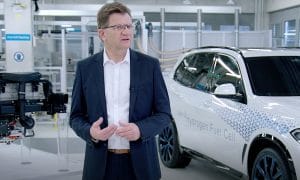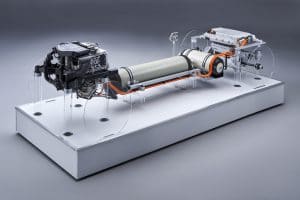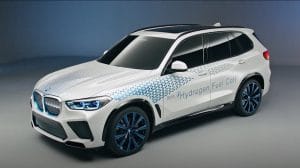Automakers have been pursuing and promoting their electrification efforts for so long – and loud – other alternative fuel sources have seemingly gone by the wayside. However, BMW’s reminding us it’s still working on its hydrogen fuel cell program.
The Bavarian automaker revealed the preliminary specifications about i Hydrogen Next, a hydrogen-electric drivetrain that it has developed in partnership with Toyota, perhaps the leader in that area. The two companies have been working together for seven years.
“The hydrogen fuel cell technology could quite feasibly become the fourth pillar of our powertrain portfolio in the long term. The upper-end models in our extremely popular X family would make particularly suitable candidates here,” said Klaus Fröhlich, BMW’s development boss, in the video introducing the new powertrain.
(BMW plugs back in with long-delayed i4 concept.)
BMW’s i Hydrogen Next system is made up of a pair of 700-bar tanks holding 13.2 pounds of hydrogen, a fuel cell and an electric motor. That electric motor, the fifth iteration, will power future electric cars, like the i4 and the iNext, and what BMW calls a peak power battery installed over the drive unit.
Fröhlich, member of the Board of Management of BMW AG, Research and Development, explained that fuel cell uses hydrogen and oxygen to generate electricity and sends it to the motor. The battery can produce a temporary power spurt of 374 horsepower, but typically the system produces a steady 170 hp.
Although a fuel cell is, at its core, an electric vehicle, the difference is in the fueling, or more precisely the refueling. Fuel cells offer a significant advantage when it comes to refueling time: five minutes or less. Additionally, its less temperature sensitive, so no massive reduction in range that battery electrics often exhibit in the cold. It emits just water vapor.
Before getting too excited, Fröhlich notes that the company has no intention of rolling out a bunch of fuel cell vehicles, like Toyota did with its Mirai. However, it plans to produce a small number of X5 SAVs in 2022 to test them as everyday vehicles.
(All BMW models to be electric by 2030.)
He also noted a primary reason for not attempting to grow fuel cells at a quicker pace is the lack of infrastructure in place to refuel the tanks. Until there is a commitment to resolving that issue, he said, there’s no plan to build more. However, he did note that if or once that occurs, BMW will be in a place to quickly ramp up production.
“Currently, the right conditions are not in place to offer BMW customers a fuel-cell production vehicle,” he said.
“Short term, we can bring green energy on to the roads faster with battery-electric vehicles. Pilot it. Master it. Scale it up. This is what we have done successfully with electric mobility which is why we are in a position to rapidly roll out emobility technology at the BMW Group. Further down the line, we will able to take the same approach with hydrogen fuel cell technology.”
Fröhlich noted that the fuel-cell technology is part of the company’s multipronged approach to vehicle development, which also includes electric drivetrains, hybrid systems, gasoline- and diesel-burning engines. He noted they will coexist going forward because they all address different needs, adding the next-generation 7 Series, coming in 2022, will be offered with at least four powertrain types.
(BMW-Toyota Alliance could signal revival of fuel cell.)
BMW is involved BRYSON (a German acronym for space-efficient hydrogen storage tanks with optimized usability) with the Munich University of Applied Sciences, Leichtbauzentrum Sachsen GmbH, the Technical University of Dresden and WELA Handelsgesellschaft mbH to develop pioneering high-pressure hydrogen storage tanks. These are to be designed to allow easy integration into future universal vehicle architectures.



